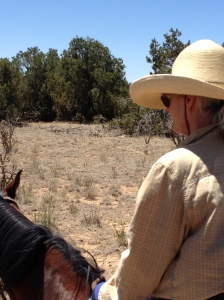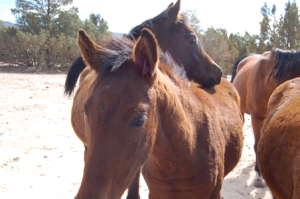Recently I have heard this expression “cowgirl up!” told to horse owners who are not coming forward in their leadership with their horses. Among some trainers and clinicians, it is meant to be helpful, but for many women and some gentle men, it only serves to make them feel insecure about their leadership around their horses. It usually involves being chastised for not “making” your horse do something he is supposed to (in human terms). I know when this was first posed to me it made all my insecurities surrounding being credible come rearing up and made me into a quivering mass of jelly. Women in particular can have difficulty speaking up and that ability in a relationship with a horse is necessary, even though speaking up is going to take a different form.

Let’s face it – leadership is vital. Horses live by a code, and if we don’t measure up they are either going to push us around or ignore us completely. If you have just bought a horse and don’t know much about them or had one when you were a kid but have forgotten, this message is for you. If you’ve had horses all your life and thought you are supposed to be tough and you have some success with horses but sometimes something isn’t working, this is for you too. In fact, it could be for and about any of us!
When you’re new to something, it’s hard to not know anything. Couple that with being told you’re not tough enough, not forceful enough, not a good leader and not someone your horse can respect. It will send you with your tail between your legs maybe back to the trainer because you feel so hopeless all by yourself. Or, you might just give up on horses because it seems too difficult to try to do something you’ve been told you’re no good at.
Good horsemen have the ability to really communicate with horses, but few of us were born knowing how to speak horse. When we learn about horses in the beginning, we usually take riding lessons. Most riding lessons don’t teach about forming a relationship with a horse. You learn to saddle and bridle, put your legs and hands in the right place and manage the horse to some extent. It’s not about how the horse feels that day or how you might be able to read the horse better, or how you might be able to read yourself better.
Understanding yourself is a big part of horsemanship. People who are good at human management may suddenly find horsemanship skills difficult. Like trainer Robin Gates said at a recent Waterhole Rituals clinic, most horses will succumb to pressure and submission and since that is man’s nature, it has become the preferred method of training. There are some horses, however, that don’t do well with this type of training and want the voice of the herd. Generally, we don’t buy a horse for it to stand in the pasture, we want to ride it, so we want it to be safe and enjoyable to ride. What if the horse doesn’t seem to want that?
The other thing that is important to remember is that you may have a really good bond with your horse already. We can form bonds with our horses without any real training. We can become closer to our horses by learning to speak their language. It’s just as though you were married to a Swahili man and you could understand a little of what he says, but you can’t understand him very well. You’d probably have to take a course in Swahili to be able to understand more, and deepen your relationship. With horses, you are taking a language course, which also includes the body. The Waterhole Rituals developed by Carolyn Resnick are a valuable addition to your horse knowledge. Many of you are very experienced horse people and know a lot. There is no need to throw out what you know. In some cases you may see a conflict and want to slough off some areas that don’t work for you anymore, such as practices based upon force.
These rituals are founded on the natural way horses interact with each other to insure safety, community, territory and food and water for the horse. Since horses are motivated by food and territory, this is what the Waterhole Rituals are focused on. From there, we can build on that foundation to introduce more work that does not involve food and territory, but we always come back to these rituals especially if we find the horse is needing some support in those areas.
This approach helps you to find your leadership with your horse. Nobody gets better by being criticized, I don’t care who they are, horse or human. We all get better by learning to be ourselves better, finding ourselves inside supportive processes. You will gradually find your voice, your power, your humanity, by doing these rituals with your horse. Don’t get impatient. Even if your horse likes you and you feel you have a bond, many times you can experience a lack of respect in that relationship. It needs nurturing, every day.
In my next Horses at Liberty Foundation Training clinic we will address energy around horses and body language. This is not just another training method, this can also be a journey in self-discovery. I’m designing a program of study groups for the winter months, just in case we can’t work outside with our horses. That way we can address some of the energetic issues that come up while we’re working with our horses, and figure out what we can do about them. We will learn why a person can get connection with a horse. Why one horse may be able to work with many people and another one not be able to. Why it’s important to gauge a horse’s mood so you can tell after awhile what he likes to do. Why it’s important for the horse to have a choice in the relationship.
So give yourself a little grace when somebody says to you, “Cowgirl or cowboy up!” in relation to your horse leadership. I’m going to call what I do “Cowgirl or Cowboy Energetics” because it works with what is already there, a flowering of what is already inside you, a seed that becomes a plant, a plant that has a beautiful blossom when nurtured. We will work with you, your horse, you and your horse together. Believe me, your horse will notice you, big time, in a completely different way, with interest and curiosity. This is the beginning of your beautiful relationship and leadership.
(c) Susan Smith, Horses at Liberty Foundation Training




Beautiful writing, Susan, that is congruent with what I believe about horses, too. I’ll recommend this to my students!
Thank you, Ruella! Of the same mind!
I love this post, Susan. Especially how you acknowledge how different we all are, both humans and horses, and so how our needs may vary. And it is SO easy to become intimidated by those “in the know.” There are now many different horse personality-typing systems which identify as many as dozens of types of horse personalities, all requiring unique consideration. But, as you are espousing, I do agree that working through the context of “horse language,” in an at-liberty environment , encompasses and “bridges” these differences to help form the basic horse/human bond necessary to then go farther with any real quality of achievement. Right on, Susan! I’m looking forward to some of your classes.
Thank you, Leta. That means a lot to me.
Hi Susan, well said. When will you be holding the next class?
Hi, Paige, Thanks! I’ll be holding regular clinics starting in 2013 and one small private clinic in December in Santa Fe. In 2013 the locations may vary. Keep in touch via the website http://www.orthohorse.info.